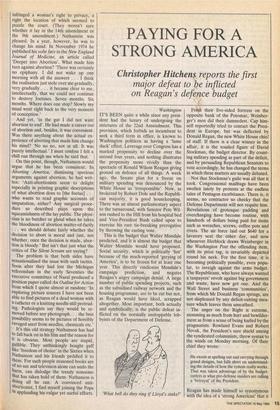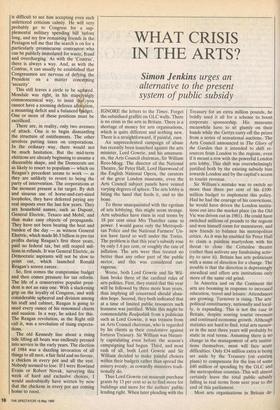PAYING FOR A STRONG AMERICA
Christopher Hitchens reports the first
major defeat to be inflicted on Reagan's defence budget
Washington IT'S BEEN quite a while since any presi- dent had the luxury of undergoing the strictures of the 22nd Amendment. This provision, which forbids an incumbent to seek a third term in office, is known to Washington politicos as having a 'lame duck' effect. Leverage over Congress has a marked propensity to decline over the second four years, and nothing illustrates the propensity more vividly than the spectacle of Ronald Wilson Reagan giving ground on defence of all things. A week ago, the Senate plan for a freeze on military spending was denounced by the White House as 'irresponsible'. Now, as brokered by Robert Dole and the Republi- can majority, it is good housekeeping. There was an almost parliamentary aspect to the turnaround, with Senator Pete Wil- son rushed to the Hill from his hospital bed and Vice-President Bush called upon to exercise his rare tie-breaking prerogative by throwing the casting vote.
This is the budget that Walter Mondale predicted, and 'it is almost the budget that Walter Mondale would have proposed. Social security, which is politically 'hot' because of the much-reported 'greying of America', is to be frozen for at least one year. This directly vindicates Mondale's campaign prediction, and negates Reagan's angry campaign denial. A large number of public spending projects, such as the subsidised railway network and the housing programme, are to be cut but not, as Reagan would have liked, scrapped altogether. Most important, both actually and symbolically, is the public defeat in- flicted on the normally unstoppable lob- byists of the Department of Defense.
'What bell do they ring if Lloyd's sinks?' Fri their five-sided fortress on the opposite bank of the Potomac, Weinber- ger's men did their damnedest. Cap him- self reportedly tried to contact the Presi- dent in Europe, but was deflected by Donald Regan, the new White House chief of staff. If there is a clear winner in the affair, it is the tousled figure of David Stockman, the budget director. By count- ing military spending as part of the deficit, and by persuading Republican Senators to vote accordingly, he has changed the terms in which these matters are usually debated.
Not that Stockman's guile was all that it took. Congressional mailbags have been swollen lately by protests at the endless tales of Pentagon exorbitance. There is, it seems, no contractor so cheeky that the Defense Department will not requite him. Revelations of grotesque padding and overcharging have become routine, with hundreds of dollars being paid for items such as wrenches, screws, coffee pots and rivets. The air force laid out $640 for a lavatory seat the other day, and now whenever Herblock draws Weinberger in the Washington Post the offending item, with its price tag, is invariably depicted round his neck. For the first time, it is becoming politically possible, even popu- lar, to inveigh against the arms budget. The Republicans, who have always wanted a taxpayers' revolt against big government and waste, have now got one. And the Wall Street and business 'communities', from which Mr Donald Regan springs, are not displeased by any deficit-cutting mea- sure which leaves them unscathed.
The anger on the Right is extreme, stemming as much from hurt and bewilder- ment as from a sense of being knifed by the pragmatists. Rowland Evans and Robert Novak, the President's sure shield among the syndicated columinists, threw syntax to the winds on Monday morning. Of their chief they wrote:
He excels at spelling out and carrying through grand designs, but falls short on understand- ing the details of how the system really works. That was taken advantage of by the budget- cutters in what pro-defense insiders are calling a 'betrayal' of the President.
Reagan has made himself so synonymous with the idea of a 'strong American' that it is difficult to see him accepting even such unlettered criticism calmly. He will very probably go to Congress for a sup- plemental military spending bill before long, and my few remaining friends in the Pentagon tell me that the search is on for a particularly promiscuous contractor who can be publicly immolated for waste, fraud and overcharging. As with the 'Contras', there is always a way. And, as with the Contras, it can usually be established that Congressmen are nervous of defying the President on a matter concetping `security'.
This still leaves a circle to be sqtfared. Mondale was right, in his stupefyingly commonsensical way, to insist that •you cannot have a zooming defence allocation, a mounting deficit and a balanced 'budget. One or more of these positions must be sacrificed.
There are, in reality, only two avenues of attack. One is to begin dismantling the structure of entitlements. The other involves putting taxes on corporations. In the ordinary way, there would not be much hesitation. But the mid-term elections are already beginning to assume a discernible shape, and the Democrats are as likely to resort to populism — which on Reagan's precedent seems to work — as they are unlikely to revert to being the party of intervention. The corporations at the moment present a fat target. By deft and sinuous use of horse-and-cart-sized loopholes, they have deferred paying any real imposts over the last few years. They are household names, such as Dupont, General Electric, Texaco and Mobil, and thus make easy objects of propaganda. They have not been bearing the heat and burden of the day — as witness General Electric, which made $6.5 billion in pre-tax profits during Reagan's first three years, paid no federal tax, but still reaped mil- lions in refunds. It was General Electric, as Democratic aspirants will not be slow to point out, which launched Ronald Reagan's screen career.
So, first comes the compromise budget and then comes pressure for tax reform. The life of a conservative populist presi- dent is not an easy one. With a slackening grip on the loyalty of Congress, and with considerable upheaval and division among his staff and cabinet, Reagan is going to need every ounce of his renowned charm and suasion. In a way, he asked for this. The Reagan revolution, as the Right still call it, was a revolution of rising expecta- tions.
The old Kennedy line about a rising tide lifting all boats was endlessly pressed into service in the early years. The election of 1984 was a dazzling invocation of all things to all men, a fair field and no favour, a chicken in every pot and all the rest. Nobody seemed to lose. If I were Rowland Evans or Robert Novak, surveying this week of hard and exclusive choices, I would undoubtedly have written by now that the chickens in every pot are coming home to roost.















































 Previous page
Previous page